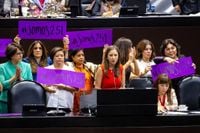On March 25, 2025, the Mexican Chamber of Deputies made a significant decision impacting Cuauhtémoc Blanco, a former professional football player turned politician, by voting to maintain his immunity against prosecution for allegations of attempted sexual abuse. This decision was reached in a session marked by considerable tension and visible dissent.
The vote concluded with 291 deputies in favor of maintaining Blanco's jurisdiction, while 158 opposed it, alongside 12 abstentions. The loud deliberation caught the attention of both supporters and detractors, representing a fierce debate over the protection of public officials accused of serious crimes.
Blanco's immunity had been called into question following accusations made by his half-sister in December 2023, where she alleged that he attempted to sexually assault her while he was serving as the governor of Morelos. Since then, the State Attorney General's Office had called for the removal of his parliamentary immunity, suggesting that the evidence compiled was sufficient to warrant a trial. However, the Section Instructora of the Congress rejected this petition, citing inconsistencies in the legal files as a major reason.
During the session, representatives from the PAN (National Action Party) and Movimiento Ciudadano attempted to extend the debate, emphasizing the gravity of the allegations against Blanco. Yet, they were outnumbered by the coalition supporting the former governor, which included members from Morena (Blanco’s own party), the PRI (Institutional Revolutionary Party), and the PVEM (Green Party). Critics labeled the decision as an example of political maneuvering that prioritize party loyalty over accountability.
Thus, as the vote interval began, many dissenting voices surged through the chamber. Deputies raised concerns that the protection extended to Blanco compromised the integrity of legislative accountability and disrespected the dignity of victims. Annia Sarahí Gómez Cárdenas, a PAN deputy, passionately remarked, "Mujeres, hagan conciencia, porque además hoy la víctima se llama Nidia, mañana, señoras, mientras sigamos protegiendo al patriarcado y a los machistas y a los agresores puede ser cualquiera de nosotras" (Women, be aware, because today the victim is named Nidia, tomorrow, ladies, while we continue to protect patriarchy and aggressors it could be any of us). This statement underscored the emotional weight the discussion was carrying.
Later, Citlalli Hernández, Secretary of Women, broke her silence to defend the legislative response to the allegations, arguing that it reflected a flawed judicial approach rather than a failure to address serious issues of abuse. "Me parece reprobable que la discusión se centre en un posible desafuero" (It seems reproachable to me that the discussion centers on a possible challenge to immunity), she asserted, framing the narrative within a broader context of political usage of allegations rather than strictly a matter of justice.
As the session reached a boiling point, the atmosphere grew heated with members from various parties contending with each other over procedural integrity. The head of the instructive section, Hugo Eric Flores, justified the rejection of the charges on the basis of judicial flaws within the evidence submitted by the Morelos Prosecutor's Office, stating, "Lo que hoy se discute no es si procede o no el desafuero de un integrante de la Cámara de Diputados" (What is currently being discussed is not whether the impeachment should proceed or not against a member of the Chamber of Deputies), framing his argument on legal grounds rather than the ethics of the accusations.
This incident marks another chapter in the ongoing struggle within Mexican politics regarding gender-based violence and how allegations against powerful figures are processed. It's become a beacon for both activists seeking justice for victims and legislators who are faced with the juxtaposition of political expediency against public accountability.
Following the vote, Blanco addressed the assembly, insisting on his innocence and expressing his readiness to cooperate with legal processes, stating, "Lo único que les pido y que yo, con mucho gusto, estaría dispuesto a ir a la Fiscalía. Yo no tengo miedo" (All I ask is that I would gladly be willing to go to the Prosecutor's Office. I am not afraid), trying to present himself as forthcoming despite the overwhelming support from his party during the voting.
In the end, the decision to maintain Cuauhtémoc Blanco's immunity has deepened the existing fractures within the political landscape, spurring ongoing debate on numerous fronts: Around legislative ethics, the handling of sexual assault allegations, and the role of political parties in protecting their members at the potential expense of justice. Such occasions display the challenges faced by female legislators within a system that continues to grapple with the legacies of patriarchy.
The outcome of this case and the surrounding events will likely have a lasting impact on how similar allegations are treated in the future, calling into question the commitment of lawmakers to address systemic issues of gender-based violence and their responsibility towards victims seeking justice.









